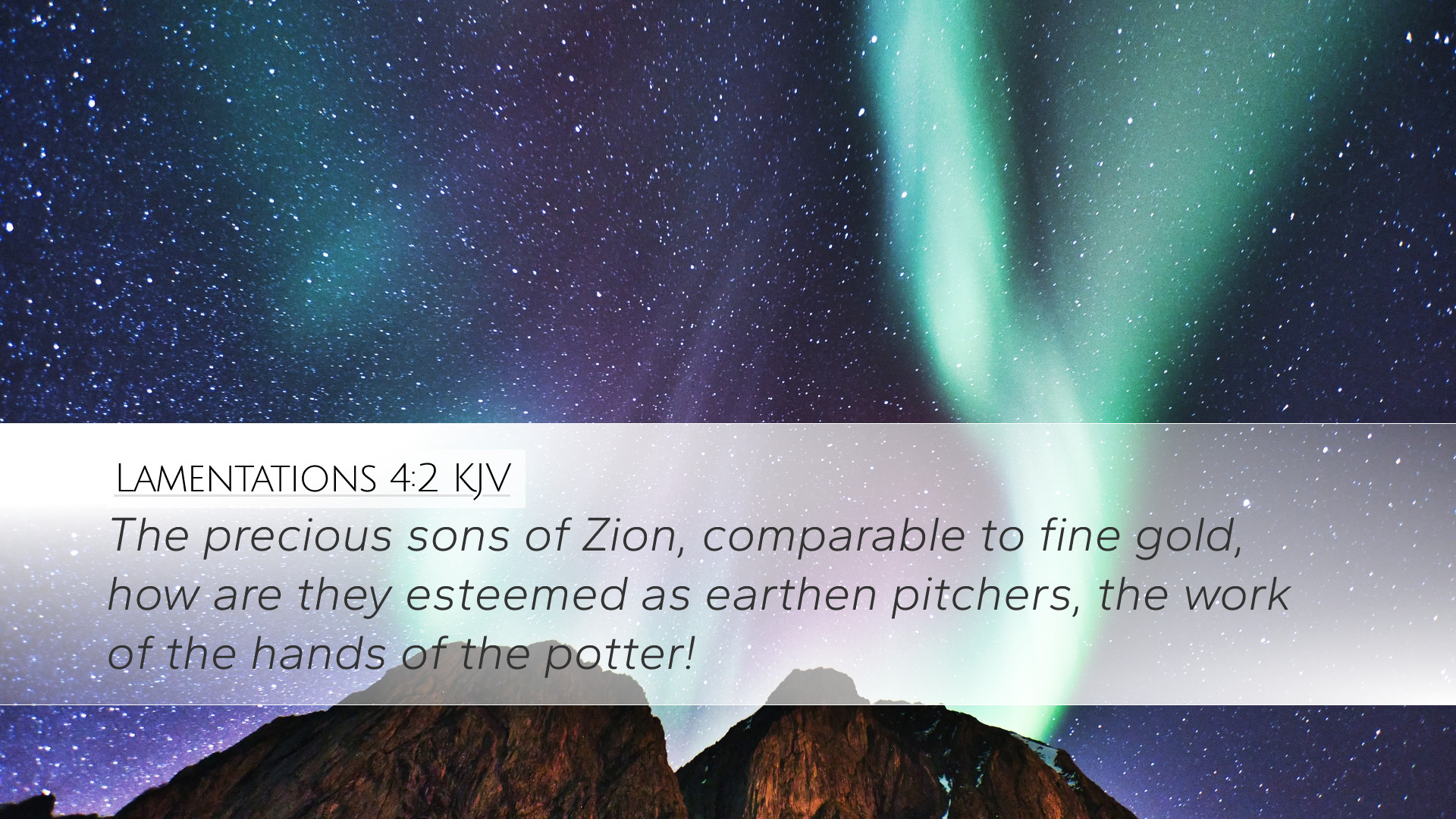Lamentations 4:2 - Commentary Summary
Verse Text: "The precious sons of Zion, comparable to fine gold, how are they esteemed as earthen pitchers, the work of the hands of the potter!"
Introduction
The Book of Lamentations, traditionally attributed to the prophet Jeremiah, encapsulates the profound sorrow following the fall of Jerusalem. In Lamentations 4:2, the contrast between the original value of the people of Zion and their current disgrace captures the essence of Israel's tragedy.
The Precious Sons of Zion
Matthew Henry emphasizes the term "precious" to denote the great worth of the people of Jerusalem in God’s eyes. They were seen as "sons," indicative of their status as God's children, thus underlining the depth of their fall from dignity.
- Spiritual Heritage: Henry points out that these sons were endowed with great privileges as inheritors of the promises made to their forefathers.
- Divine Esteem: Such a term indicates their intrinsic value, similar to "fine gold," suggesting not only beauty but also strength and resilience.
Comparison to Fine Gold
Albert Barnes elaborates on the metaphor of "fine gold." The comparison signifies purity, value, and preciousness:
- Purity of Essence: Gold, being an enduring metal, represents the once pure and noble qualities of Israel.
- Subject to Value Disparity: In their current state, they are reduced to "earthen pitchers," which symbolizes fragility and insignificance.
Transition to Earthen Pitchers
Adam Clarke comments on the shift from "fine gold" to "earthen pitchers" as a poignant illustration of decline:
- Condition of Dishonor: Clarke suggests that this stark transformation signifies a loss of honor and dignity, representing how severely they have fallen.
- Craftsmanship of the Potter: The phrase "the work of the hands of the potter" reflects on God's sovereignty in creation and the inherent value bestowed upon humanity.
Theological Implications
This passage not only depicts the physical and moral decline of the Jewish people but also serves as a reminder of the consequences of turning away from God. Both Barnes and Henry reflect on the notion of judgment and its implications for spiritual heritage:
- Judgment and Consequences: The transformation of identity from gold to clay illustrates God's judgment on a people who turned from righteous paths.
- Restoration Hope: Nonetheless, the lament serves to remind believers today of God’s enduring love and the possible restoration through repentance.
Pastoral Applications
For pastors, this verse carries profound implications for teaching about value in God's eyes and the consequences of sin:
- Value of Community: Encouraging congregations to recognize their value as children of God can foster an environment of respect and dignity.
- Repentance and Restoration: Highlighting the path of return to God, where individuals can reclaim their worth in Christ.
Scholarly Reflections
Scholars may delve deeper into the socio-historical context of Lamentations:
- Historical Context: The verse provides insights into the cultural and spiritual landscape of post-exilic Jerusalem.
- Comparison with Other Scriptures: Exploring other biblical texts that reflect on themes of loss, judgment, and potential restoration, such as in Isaiah and Ezekiel.
Conclusion
Lamentations 4:2 poignantly depicts the value of the people of God and their tragic decline. The rich commentary from Matthew Henry, Albert Barnes, and Adam Clarke invites pastors, students, theologians, and scholars to reflect on the implications of this verse both for personal faith and communal identity.
By understanding this lament, believers are encouraged to reclaim their identity in God, striving toward restoration and hope in the face of despair.


